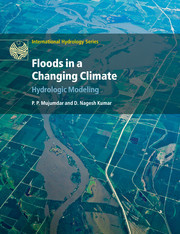Description
Floods in a Changing Climate
Hydrologic Modeling
International Hydrology Series
Authors: Mujumdar P. P., Nagesh Kumar D.
Provides unique synthesis of various modeling methodologies used to aid planning and operational decision making, for academic researchers and professionals.
Language: English
Subjects for Floods in a Changing Climate:
Approximative price 64.99 €
In Print (Delivery period: 14 days).
Add to cart
Floods in a Changing Climate
Publication date: 03-2018
Support: Print on demand
Publication date: 03-2018
Support: Print on demand
Approximative price 126.22 €
In Print (Delivery period: 14 days).
Add to cart
Floods in a changing climate. Hydrologic modeling
Publication date: 11-2012
188 p. · 22.2x28.2 cm · Hardback
Publication date: 11-2012
188 p. · 22.2x28.2 cm · Hardback
Description
/li>Contents
/li>Biography
/li>
Various modeling methodologies are available to aid planning and operational decision making: this book synthesises these, with an emphasis on methodologies applicable in data scarce regions, such as developing countries. Problems included in each chapter, and supported by links to available online data sets and modeling tools, engage the reader with practical applications of the models. Academic researchers in the fields of hydrology, climate change, and environmental science and hazards, and professionals and policy-makers working in hazard mitigation, remote sensing and hydrological engineering will find this an invaluable resource. This volume is the second in a collection of four books on flood disaster management theory and practice within the context of anthropogenic climate change. The others are: Floods in a Changing Climate: Extreme Precipitation by Ramesh Teegavarapu, Floods in a Changing Climate: Inundation Modelling by Giuliano Di Baldassarre and Floods in a Changing Climate: Risk Management by Slodoban P. Simonovi?.
Part I. Introduction: 1. Introduction; Part II. Modeling for Climate Change Impact Assessment: 2. Hydrologic modeling for floods; 3. Climate change impact assessment; Part III. Remote Sensing, GIS and DEM for Modeling of Floods: 4. Remote sensing (RS) for hydrologic modeling; 5. Geographic information system (GIS) for hydrologic modeling; Part IV. Case Studies and Future Perspectives: 6. Case studies and future perspectives; References; Index.
P. P. Mujumdar is a Professor in the Department of Civil Engineering at the Indian Institute of Science (IISc), Bangalore, India, and holds an Associate Faculty position in the Divecha Center for Climate Change at IISc, Bangalore. He is also Chairman of the Water Resources Management Committee of the International Association for Hydro-Environment Research (IAHR). Professor Mujumdar's area of specialization is water resources with a focus on climate change impacts that includes downscaling and uncertainty modeling. He also works as a professional consultant across areas including floodplain management, reservoir operation, urban storm water drainage, lift irrigation and hydropower development. He is a Distinguished Visiting Fellow of the Royal Academy of Engineering, UK, and is currently a member of the Editorial Board of the journal Advances in Water Resources.
D. Nagesh Kumar is a Professor in the Department of Civil Engineering at the Indian Institute of Science (IISc), Bangalore, India, and holds an Associate Faculty position in the Center for Earth Sciences. His primary research areas include applications of remote sensing and GIS in hydrologic modeling, soft computing, hydrologic teleconnections and water resources systems. Professor Kumar also works in professional consultancy in areas such as river basin planning and management, flood routing, downscaling for climate change projections and reservoir operation. He is currently an Associate Editor of the Journal of Hydrologic Engineering.
D. Nagesh Kumar is a Professor in the Department of Civil Engineering at the Indian Institute of Science (IISc), Bangalore, India, and holds an Associate Faculty position in the Center for Earth Sciences. His primary research areas include applications of remote sensing and GIS in hydrologic modeling, soft computing, hydrologic teleconnections and water resources systems. Professor Kumar also works in professional consultancy in areas such as river basin planning and management, flood routing, downscaling for climate change projections and reservoir operation. He is currently an Associate Editor of the Journal of Hydrologic Engineering.
© 2024 LAVOISIER S.A.S.




